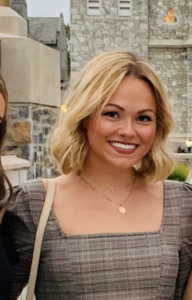We are excited to share the first installment of our 2020 Student Blog Series! The student blog series highlights original pieces authored by first-year law students at Villanova University Charles Widger School of Law. Read on for Allyson Fifer’s contribution to the Student Blog Series.
“F**ck with me and get some money.” Have you ever considered how often you hear songs with these kinds of lyrics on the radio? Do you even tune in and realize what is being said? Have you become so desensitized to the normalization and glamorization of prostitution in the mainstream media that you just begin singing along, without considering what the lyrics mean or what their implications are? If you have become desensitized to prostitution-related rhetoric in popular music, you are not alone. According to a study done by Elon University regarding the influence of rap/hip-hop music on audience perceptions, it was found that “all respondents . . . who listen to rap/hip-hop music for the lyrics agreed or strongly agreed that most rap/hip-hop music suggests women are just for male sexual satisfaction.” The portrayal of women engaged in prostitution in popular music often desensitizes listeners to the commercial sex industry.
The popular song “No Limit” by hip-hop star G-Eazy, featuring Cardi B and A$AP Rocky, exemplifies this harmful rhetoric. The song describes the rappers engaging in meaningless sex with women in exchange for money. Some lyrics that highlight this theme include, “f**k with me and get some money” and “hunnit bands from the safe, in your face, what’d you say? Money dance.” By examining these two snippets of lyrics, it is clear that the exchange of sex for money is occurring in this song. However, the exchange is being portrayed in a way that seems incredibly glamorous – giving off an illusion of unlimited amounts of money and the fame that comes with being a popstar. Through these themes, the artists make it seem almost as if engaging in prostitution is an honor, that the women are lucky to have the opportunity to have sex with the artists in exchange for a small portion of their exuberant wealth.
This is an exceedingly destructive way to view the commercial sex industry. The women who are victimized in the commercial sex trade are not living glamorous lives; they are victims of exploitation. Victims of commercial sexual exploitation are viewed as “commodities,” bought and sold for their bodies. Because of this, they are exposed to a myriad of risks, including contraction of life threating sexual diseases, posttraumatic stress disorder, dissociative disorders, depression, eating disorders, substance abuse, and more. Furthermore, the vast majority of women engaged in prostitution have not chosen a life of commercial sex. Victims often come from vulnerable communities and are financially desperate, which leads them to believe being raped for money is their only way to make ends meet. Additionally, many were sexually abused as children, homeless, involved in foster care, running from abusive homes, and addicted to drugs to ease the pain of their trauma, ultimately leading them to be exploited in the commercial sex trade. There is nothing glamorous about a life in the commercial sex trade, its victims live lives of pain and their struggles are not recognized in popular culture songs, such as “No Limit.”
As emphasized in a newsletter titled Rhetoric Matters by CSE Institute, “Words are important. They can be used to enlighten or to spread dangerous misconceptions.” In the case of “No Limit,” and many other popular songs in today’s culture, words are being used to spread dangerous misconceptions about the commercial sex trade that lead to desensitization and a misconceptions of the horrid truths that lie within. The CSE Institute hopes that artists will begin to consider the detrimental effects their lyrics have on listeners, and that listeners will pause while listening to these songs and realize the words they are singing are not accurate representations of the realities of women who are being exploited for sex.
Allyson Fifer is a first-year student at the Villanova University Charles Widger School of Law. Allyson is from central New Jersey and attended The College of New Jersey. Allyson holds a Bachelor’s of Science in Business Marketing with a Minor in Law, Politics, and Philosophy. Upon graduation, Allyson hopes to make a difference in the lives of others as a criminal law attorney.



